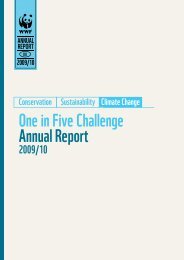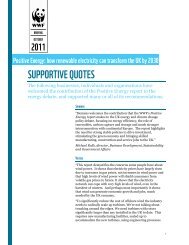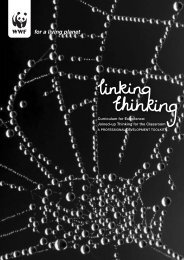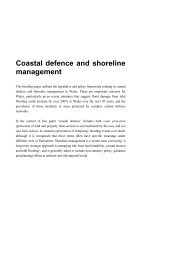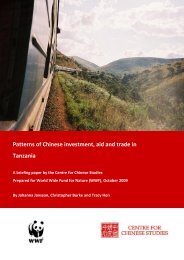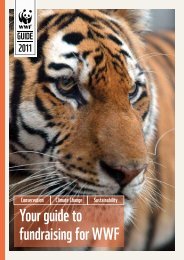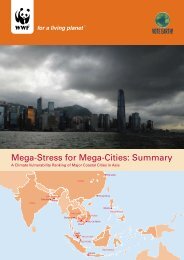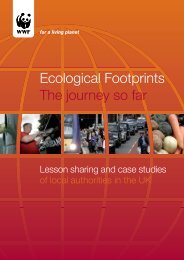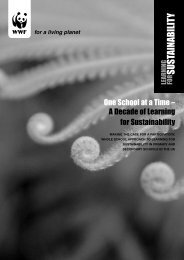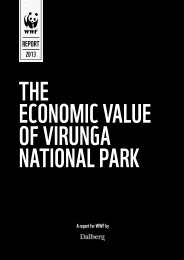SOUVENIR ALERT LEAFLET - WWF UK
SOUVENIR ALERT LEAFLET - WWF UK
SOUVENIR ALERT LEAFLET - WWF UK
You also want an ePaper? Increase the reach of your titles
YUMPU automatically turns print PDFs into web optimized ePapers that Google loves.
<strong>SOUVENIR</strong> <strong>ALERT</strong> <strong>LEAFLET</strong><br />
You may be tempted to buy wildlife souvenirs on holiday, but remember that trade in many animals,<br />
plants and products made them is controlled internationally to safeguard wild species.<br />
Almost 900 species of animals and plants are currently banned from international trade and a further<br />
33,000 are strictly controlled by CITES (Convention of International Trade in Endangered Species) and<br />
European Union legislation. Those banned from international trade include tigers, rhinos, elephants,<br />
whales and marine turtles, and trade is controlled for many corals, reptiles, orchids and cacti.<br />
So think before you buy- you may be breaking the law and your souvenirs could be confiscated by<br />
customs on your return.<br />
……………………………………………………………………………….<br />
INTERNATIONAL TRADE IN THE FOLLOWING IS PROHIBITED:<br />
It is not easy to know which souvenirs or gifts to avoid buying, so here’s a brief guide to some you’re<br />
most likely to come across. International trade is banned altogether. Remember trade exist to protect<br />
these animals and plants. Your decisions can help them survive.<br />
Elephant ivory, despite the sanctioning of some legal ivory sales globally, illegal trade in ivory<br />
continues and you cannot bring any ivory back to the <strong>UK</strong>. Watch out for stalls selling ivory carvings<br />
and jewellery outside hotels and shops, this occurs particularly in Africa and Asia.<br />
Traditional Asian Medicine containing endangered species. Trade in any medicines claiming to<br />
contain species such as tiger, leopard, musk, rhino, bear and plants, such as Sausserea costus, gastrodia<br />
orchid or dendrobium orchid, are prohibited.<br />
Sea turtle shells<br />
All jewellery, hair combs and sunglasses made from endangered sea turtles and often found in the<br />
Carribean and tropical beach resorts are banned.<br />
Big cat furs- Clothing and curios made from the skins and products of the jaguar, leopard, snow<br />
leopard, cheetah and tiger are banned.<br />
Shahtoosh- the wool of the endangered Tibetan Antelope used to make shawls, have become<br />
increasingly popular with fashion conscious tourists. However, these products are totally illegal.<br />
………………………………………………………………………………………<br />
INTERNATIONAL TRADE IN THE FOLLOWING REQUIRES A SPECIAL PERMIT:<br />
Trade in many plants and animals is controlled so that it does not threaten their survival in the wild.<br />
You may bring back souvenirs made from certain species where international trade is allowed,<br />
provided they are for your personal use and you have a CITES permit from the country of export.<br />
Live animals and birds- regardless of species, all must have health certificates from Defra and go<br />
through a quarantine period, before they can legally enter the <strong>UK</strong>. New legislation means no wild birds<br />
can be brought into the <strong>UK</strong>, with trade only allowed in captive-bred birds from approved countries<br />
(Australia, Brazil, Canada, Chile, Croatia, Israel, New Zealand and the USA).<br />
Coral- nearly a million species depend on coral reefs but coral is sold in various forms, such as<br />
jewellery and ornaments.<br />
Queen conch shells - these large pink and white shells can be found in the Caribbean Sea, but require a<br />
permit for import to the <strong>UK</strong>.<br />
Orchids and Cacti- the demand for protected specimens of plants continues. These all require permits<br />
for import into the <strong>UK</strong>.
Reptile skin products- Bags, shoes, watch-straps and belts made from the skins of snake, lizard,<br />
alligator and crocodile require permits to import. Some live snakes and lizards are also illegally traded<br />
as pets!<br />
Caviar- all species of sturgeon and their caviar (unfertilised eggs) are covered by controls. You may<br />
however bring up to 125 grams of caviar into the EU for personal consumption.<br />
…………………………………………………………………………………<br />
REMEMBER- If you are unsure about whether you need a permit to import wildlife souvenirs from<br />
abroad, check with Animal Heath's Wildlife Licensing and Registration Service before you buy. Call<br />
+44 (0) 117 372 8774 or e-mail: wildlife.licensing@animalhealth.gsi.gov.uk.<br />
WORKING TO PROTECT ENDANGERED SPECIES<br />
CITES, the Convention on International Trade in Endangered Species, is an international treaty, which<br />
was signed in 1973 to protect animals and plants from over-exploitation. 173 countries have now<br />
joined CITES.<br />
The Souvenir Alert Campaign is a joint initiative between the Department of the Environment Food<br />
and Rural Affairs (Defra) and <strong>WWF</strong>.<br />
Become the Eyes and Ears of <strong>WWF</strong>.<br />
<strong>WWF</strong> needs your help to crack illegal wildlife trade. You can play a critical role in curbing illegal and<br />
non-sustainable trade. If you have any information about wildlife smuggling call 01483 426111 and ask<br />
for an Eyes & Ears Action Pack to report your findings or visit our website: www.wwf.org.uk



